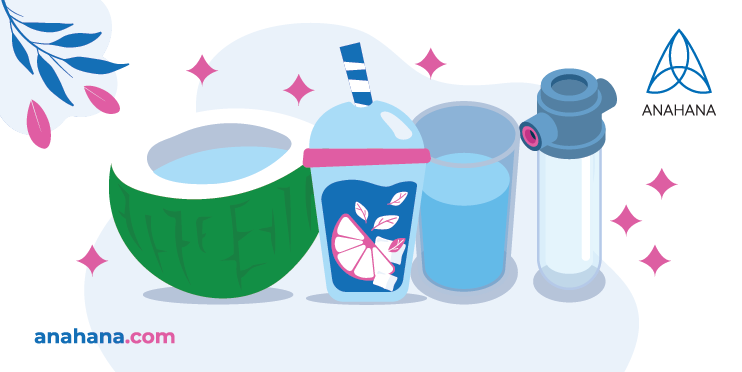
Table of Contents
Explore the transformative power of Dry January. This guide offers practical tips, drink ideas and the health benefits of a month without alcohol.
Dry January Explained
Each January, a wave of change sweeps across many, echoing the New Year's resolutions for better health and well-being.
Among these resolutions, Dry January has surged in popularity, becoming a beacon for those looking to reassess their relationship with alcohol and to take better care of their overall health.
This month-long journey of abstaining from alcohol promises a host of benefits - from improved liver health and blood pressure to enhanced energy levels and weight loss.
Beyond physical health, Dry January offers a moment of reflection on drinking habits and their impact on our lives.
Below, we listed all the tips and tricks for going sober for 30 days and the health benefits of this popularized initiative.
What is Dry January?
Dry January is a public health initiative originally spearheaded by Alcohol Change UK, which encourages people not to drink alcohol for the first month of the year.
It started as a way to encourage people to reset after the excesses of the holiday season. Participating in Dry January involves giving up alcohol for a month, a challenge that has been embraced by millions worldwide.
This initiative is not just about taking a break from alcohol consumption; it's an opportunity to reevaluate one's drinking habits and understand the impact of alcohol on overall health.
What are the Benefits of Dry January?
Participating in "Dry January," where individuals abstain from alcohol for January, can offer several potential benefits:
- Lower blood pressure: Alcohol can raise blood pressure, so cutting it out can help reduce blood pressure levels, which is beneficial for heart health.
- Better sleep: Alcohol can disrupt sleep patterns and prevent deep, restful sleep. Abstaining from alcohol can lead to improved sleep quality, making you feel more rested and alert.
- Improved appearance: Alcohol can affect your skin and overall appearance. It can cause dehydration, lead to dry skin, and exacerbate conditions like acne. Without alcohol, you might notice clearer, more hydrated skin, less puffy face and brighter eyes.
- Stronger immune system: Regular alcohol consumption can weaken the immune system, making you more susceptible to illnesses. A break from alcohol can help strengthen your immune response.
- Clearer mind: Alcohol can affect your cognitive functions, mood, and mental health. Abstaining can lead to a clearer mind, improved concentration, and potentially a more stable mood.
- Reduced liver fat: Abstaining from alcohol gives the liver a chance to recover, reducing liver fat and lowering the risk of alcohol-related liver diseases.
These benefits can contribute to an overall sense of well-being and health improvement. It's important to note that the extent of these benefits can vary depending on individual factors like your general health, how much you usually drink, and other lifestyle choices.
Tips on How to Do Dry January
Successfully participating in the Dry January challenge requires more than just a decision; it involves strategy and planning. Here are some actionable tips to help you stay dry:
- Set clear goals: Understand your reasons for doing Dry January. Whether it's for health, saving money, or reassessing your drinking habits, having clear goals helps maintain focus.
- Find support: Join a community or engage with friends who are participating. Support can keep you motivated and accountable.
- Discover alternatives: Explore non-alcoholic drink options to fill the gap left by alcoholic beverages. Experimenting with mocktails or alcohol-free beer can be fun and satisfying.
- Reflect regularly: Use this time to think about your relationship with alcohol. Understanding your drinking triggers can help in developing healthier habits post-January. Consider journaling about your alcohol-free journey to track progress.
Five Ideas for Dry January Drinks

Abstaining from alcohol doesn't mean missing out on delicious drinks. Here are five great options to enjoy during Dry January that will leave you hydrated, full of electrolytes and happy:
- Non-alcoholic beer: Many breweries now offer alcohol-free versions of their popular beers, perfect for those who miss the taste of a cold brew.
- Mocktails: Get creative with mocktails – these non-alcoholic cocktails can be as sophisticated and enjoyable as their alcoholic counterparts. For example, try an iced mint tea with some cane sugar as a substitute for a Mojito.
- Herbal teas: A healthy and relaxing alternative, herbal teas come in various flavors and can be a great evening substitute for a glass of wine.
- Fruit-infused water: Simple yet refreshing, infusing water with fruits like lemon, berries, or cucumber adds a flavorful twist to staying hydrated.
Drawbacks of Dry January
While Dry January has many benefits, it's important to recognize potential drawbacks and safety risks associated with this initiative:
- False sense of security: Some participants might think a month without alcohol rectifies prolonged heavy drinking, which isn't the case. One month of abstinence doesn't erase long-term health risks.
- Binge drinking post-January: There's a risk of returning to drinking more heavily once February arrives. It's crucial to avoid compensating for the dry month by drinking more alcohol as you enter the new month, especially if there is a general alcohol concern.
- Underlying problems unaddressed: For those with serious alcohol dependence, stopping abruptly without professional guidance can be harmful. Dry January isn't a substitute for proper treatment of alcohol abuse or addiction by heavy drinkers.
- Social factors: Participating in Dry January can lead to social challenges, as abstaining from alcohol might isolate individuals from social gatherings where drinking is a norm. This can sometimes result in peer pressure or a feeling of exclusion in environments where alcohol is central to socializing.
What is Damp January?
For some, the idea of completely giving up alcohol for a month can be daunting. Enter Damp January – a more moderate approach to drinking alcohol.
Damp January involves reducing alcohol consumption rather than completely abstaining. This could mean limiting the number of drinks per week or choosing to drink only on certain days.
It's a way for you to become more mindful about your drinking habits without the pressure of complete abstinence.
While Damp January doesn't offer the same detoxifying benefits as Dry January, going damp can still promote healthier drinking behaviors.
Takeaway
Dry January, whether embraced as a temporary health boost or a step towards changing drinking habits, offers a unique opportunity to reset and reflect on one's relationship with alcohol.
Despite its drawbacks, this challenge is a powerful tool for promoting better health and awareness about alcohol consumption amongst regular drinkers.
By participating in Dry January, individuals can enjoy immediate health benefits like better sleep, more energy, potential weight loss, and long-term positive changes in their drinking patterns.
Ultimately, the journey offers valuable insights into personal health and well-being, whether you go dry or damp.
Frequently Asked Questions
Will I lose weight during dry January?
Many participants report weight loss during Dry January. This is due to cutting out the high-calorie content found in alcoholic drinks. Additionally, reduced alcohol consumption can lead to healthier food choices, contributing to weight loss.
How do you stay motivated during dry January?
Staying motivated can be challenging, but here are a few strategies:
- Keep track of the benefits you're experiencing, like better sleep or more energy.
- Engage with online communities or apps dedicated to Dry January for support and motivation.
- Remind yourself of your reasons for participating and the positive changes you're making.
Is it worth not drinking alcohol for just a month?
Yes, Even a brief break from alcohol can lead to positive changes in your health and lifestyle. It offers a chance to experience potential health benefits, such as improved sleep and reduction in blood sugar, and it can also provide insight into your drinking habits and their impact on your well-being and whether you generally have a problem with alcohol use.
What is considered high alcohol consumption?
High alcohol consumption is often characterized by engaging in heavy drinking episodes, such as consuming five or more drinks on a single occasion for men or four or more drinks for women.
Organizations focused on alcohol concerns highlight that regularly exceeding these amounts can be harmful to health and increase the risk of alcohol-related problems.
References
Dry January | Alcohol Change UK
The Origins of Dry January | TIME
Dry January: Giving up alcohol can mean better sleep, weight loss and more energy
Disclaimer
The contents of this article are provided for informational purposes only and are not intended to substitute for professional medical advice, diagnosis, or treatment. It is always recommended to consult with a qualified healthcare provider before making any health-related changes or if you have any questions or concerns about your health. Anahana is not liable for any errors, omissions, or consequences that may occur from using the information provided.

By: Clint Johnson
Clint is the driving force and founder of Anahana. Clint teaches Yoga, Pilates, mindful breathing, and meditation, catering to a global community of students and teachers.